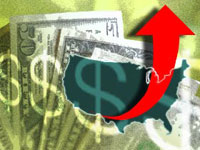Efficient markets and corporate innovation make US economy world’s most competitive
The U.S. economy has regained its ranking as the world's most competitive, largely as a result of its efficient markets and corporate innovation, according to a major report.

Following the United States were Switzerland, Denmark, Sweden and Germany in the 2007 edition of The Global Competitiveness Report, published by the World Economic Forum (WEF), an international research and policy-support group. In 2006, the U.S. economy ranked Number 6 in overall competitiveness.
“The efficiency of the country’s markets, the sophistication of its business community, the impressive capacity for technological innovation that exists within a first-rate system of universities and research centers, all contribute to making the United States a highly competitive economy," said economist Xavier Sala-i-Martin, a co-editor of the report.
However, the report warns that macroeconomic imbalances, including current account deficit, and some weaknesses of U.S. institutions “pose a risk to the country’s overall competitiveness potential.”
In the 2007 edition, 131 countries were ranked on the quality of institutions, infrastructure, macroeconomic stability, health and primary education, higher education and training, goods and labor market efficiency, financial market sophistication, technological development, market size, and business sophistication and innovation.
The United States scored high on innovation, labor market efficiency, and higher education and training. The ranking was based on publicly available data and a survey of more than 11,000 business leaders around the world. The poll pinpointed tax rates and tax regulations as the most problematic areas of the U.S. business environment.
Economist Michael Porter, another co-author of the report, said the index helps governments identify policy areas ripe for improvements and provides motivation for reforms.
Many private-sector and government economists said the resilience the U.S. economy has shown in recent years in the face of many shocks such as the 2001 terrorist attacks, corporate scandals and high oil prices can be attributed to its competitiveness, particularly the openness and flexibility of its financial markets.
In October, U.S. Treasury Secretary Henry Paulson said he believes that with these qualities the U.S. economy will be able to weather another crisis -- the slump in the housing and mortgage markets and the related credit crunch.
His optimism was supported by an October 31 Commerce Department report that said the U.S. economy grew 3.9 percent in the third quarter. The news surprised many market observers, who expected a slower growth rate.
The chairman of the President’s Council of Economic Advisers, Edward Lazear, called the growth rate “quite remarkable," in view of the fact that the housing market problems had begun to affect the economy during the third quarter.
The full text of the report and accompanying materials can be accessed on the WEF Web site.
Source: usinfo.state.gov
Subscribe to Pravda.Ru Telegram channel, Facebook, RSS!





